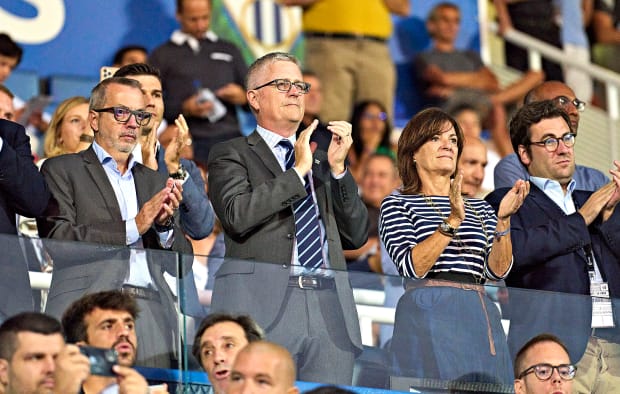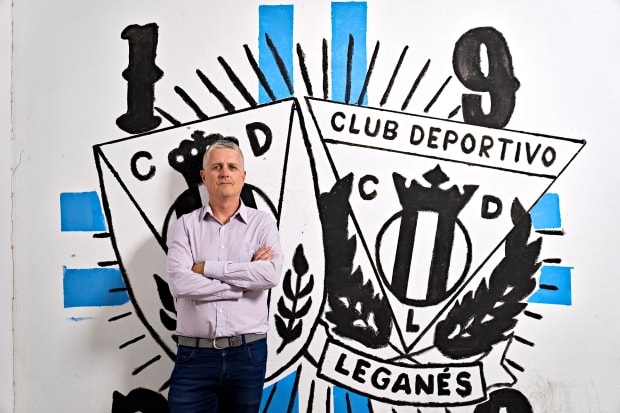This story was originally published on Oct. 13, 2022. It was included in a year-end list of SI’s best stories of 2022.
As the best team in the American League races to a double-digit division lead, its architect sits in the owner’s box of a half-full second-division Spanish soccer stadium on the outskirts of Madrid. It is the first match of his first season running CD Leganés. The owner of the opposing team, Deportivo Alavés, sits to his left, the mayor of Leganés to his right. The game is televised, but the broadcasters are calling it from a studio in Barcelona, 400 miles away.
Jeff Luhnow’s Astros played in front of packed houses of 41,000 and drew close to a million people to celebrate their 2017 World Series title; on this August night, Leganés plays before some 7,000 scattered faithful. In January, Blue Crow Sports Group, which Luhnow started, bought Cancún FC, a soccer team in the Mexican second division, for a reported $6.76 million; in June, it added Leganés for a reported $39 million. Luhnow is a hands-on owner, obsessing over everything from roster construction to player development to logo design, hoping to bring the kind of change to his second sport that he brought to his first.
To most, Luhnow appears to have taken a hard fall, even if he doesn’t see it that way. At 55, he says he may return to baseball one day, “but right now I’m pretty busy.” He says he has received “more than one” request to run an MLB team (he declines to be more specific) but turned them down.

Thomas Lovelock/Sports Illustrated
Thirty-three months after being fired amid the Astros’ cheating scandal, Luhnow is the last man in exile. Manager A.J. Hinch—who has admitted that he knew what his players were doing—was introduced as the Tigers’ skipper some 72 hours after his suspension expired in October 2020. Bench coach Alex Cora—who helped direct the scheme—was rehired on a similar time line to manage the Red Sox. DH Carlos Beltrán—the only player named in the commissioner’s report—now broadcasts games for the Yankees, one of the teams most incensed by the whole thing. But since Luhnow became eligible to return to MLB, seven clubs have fired their top baseball official, and none have hired the man who dragged the Astros from disaster to dynasty.
There are reasons for this. The others apologized. Luhnow still says he didn’t do anything wrong. The others are baseball lifers. Luhnow is a businessman. He remains a divisive figure, brimming with contradictions.
From the perspective of Luhnow’s detractors, he was a cutthroat, cold-blooded McKinsey analyst who smugly sucked the soul out of the game. He got caught cheating, he was too arrogant to admit it, and he took his ball and traded it for another ball.
From Luhnow’s perspective, he was an outsider who understood how to run a baseball team better than most of the people running baseball teams. He won’t apologize because he has nothing to apologize for, and he is now working in soccer because he never really envisioned a career in baseball anyway.
Either one—or both—could explain how Luhnow got here, to Madrid, a continent away from the scandal. His eyes dart from the play on the field to the play his sponsors are getting on the ribbon boards. Luhnow has rarely discussed what happened in Houston, but as he watches one of his new teams, he is ready to share his views on his old one.

Tim Bradbury/Getty Images
On Jan. 13, 2020, Jeff and Gina Luhnow flew to Los Cabos, Mexico, to celebrate her 49th birthday. As the plane was landing, MLB commissioner Rob Manfred released a report of his investigation into a multiyear, multipronged cheating scheme by the Astros. While the Luhnows waited at baggage claim, Jeff’s phone rang. Twenty-nine seconds later—he remembers precisely—he was unemployed.
MLB found that during Houston’s 2017 World Series season, and part of ’18, the Astros used an illegal monitor near the dugout to decipher opposing catchers’ signs. Then a player would signal to Houston’s batter what was coming by banging on a trash can. Simultaneously, video-room staffers ran a program called Codebreaker that decrypted signs, then passed their intel to the dugout so runners on second could signal batters.
Manfred wrote that he found no evidence Luhnow was aware of the trash-can plot or had ordered Codebreaker—but that he “failed to take any adequate steps” to ensure his club followed the rules. (The league accused Luhnow of erasing data from his phone before handing it over; Luhnow says he deleted only photos of his wife giving birth.) Manfred suspended him for the 2020 season.
Luhnow has maintained that he did not know anyone was cheating and that he would have stopped them if he had. In 2020, he sued the Astros for breach of contract in firing him for cause. The lawsuit also alleged that a video-room staffer had texted colleagues, “Don’t tell Jeff,” about the scheme. (Luhnow declined to share the text.) The suit was dismissed the next year at the request of both Luhnow and the Astros, suggesting a settlement had been reached. Both sides declined to comment on the matter.
Luhnow seems to see the sign-stealing scandal as a black swan event: shocking, earth-shaking and impossible to have foreseen because he wasn’t involved in it.
Does he believe the scandal tarnishes the 2017 title? “I think that the Astros built a powerhouse,” he says. “And it’s unfortunate for our fans that going through ’17 and winning that World Series and then two years later having to have people question that—it’s unfortunate, and I wish that had never happened.
“And I will never be one to say that the rule-breaking helped or didn’t help on the field because I don’t know. I don’t think there’s anybody that really knows the true answer to that. It wasn’t right. It shouldn’t have happened. When you break the rules, you break the rules, and you have to suffer the consequences of that. It’s the wrong thing to do. But how much it actually impacted the results, I have no idea. Could it have? . . . In some people’s minds, it absolutely did, and you’re never going to convince them otherwise. So unfortunately, it puts some doubt. . . . It’s unfortunate for our fans, more than anybody else, that they have to [face] that question.”
But does it tarnish the title?
“I think it tarnishes it for a lot of people, yeah.”

Thomas Lovelock/Sports Illustrated
Luhnow was ruthless in his pursuit of any advantage for the Astros, but he says he “figured we all know the rules and we’re all gonna follow the rules.” Never mind that in September 2017, after a Red Sox trainer was caught in the dugout using an Apple Watch to relay decoded signs, Manfred issued a memo to all 30 teams reminding them of the rules about electronics and sign-stealing, adding that GMs and managers would be held accountable for violations. Or that in ’18, Luhnow’s Astros accused at least two other teams of stealing signs illegally. Or that ballplayers, in general, have been cheating since Frank Corridon first spat on his fingers at the turn of the century.
Luhnow says he regrets not having a compliance department in Houston, so he has added one at Leganés and Cancún. Would reminders from a compliance department have stopped the Astros from cheating? Baseball history says no. Luhnow says yes.
This kind of argument—preposterous to those inside the game, logical to Luhnow—has defined his career. He was an engineer turned management consultant turned entrepreneur with no baseball experience—until an old McKinsey colleague mentioned that his father-in-law, Cardinals owner Bill DeWitt, was looking to add a Moneyball mindset to his club.
Luhnow arrived in St. Louis in 2003 as a vice president and immediately made enemies. Sometimes the pushback he faced bordered on absurd. His detractors called him “the accountant” and “Harry Potter.” Some longtime Cardinals employees pointedly ignored him in the hallways. On the day one person was fired, upper management moved Luhnow to a different office for fear the spurned man would come looking for him.
But when Luhnow respected someone, he gave that person autonomy. “My way of doing things is to hire very good people and let them do their jobs,” he says.
Luhnow valued both human input and data. Along with analyst Sig Mejdal, he created a model called STOUT: half stats, half scouts. The Cardinals engineered MLB’s most successful draft of this century, in 2009, when St. Louis nabbed five players who would star for the ’13 NL champs, including Matt Carpenter.

When Astros owner Jim Crane offered Luhnow the GM’s job in 2011, Crane famously handed him a blank piece of paper: There would be no parameters. Luhnow took the 30th-ranked baseball team and the 30th-ranked farm system, and he began an unpopular tear-down-and-rebuild process. As Houston tanked to an astounding 310 losses in Luhnow’s first three seasons, his peers in the industry mocked him. Fans revolted. At times the listless club earned a 0.0 Nielsen rating.
“If you are a person that wants to innovate and create positive change, you’re gonna get resistance,” Luhnow says of those early Astros years. “If the idea that you’re trying to work on was obvious and accepted by everybody, it would already be in place.”
Along the way, the team stockpiled young talent and revolutionized player development, pioneering the use of high-speed video to improve prospects. In 2017 the Astros won the first World Series in team history. They have played in every AL Championship Series since then and the World Series twice more. When The Athletic ultimately reported in November ’19 that Houston had illegally stolen signs, Luhnow says he was blindsided.
His wife, at least, believes him. Gina deploys a handful of supporting anecdotes: the time he spotted an iPad in the Astros’ dugout on TV and immediately got word to the clubhouse to have it removed; the time he read about Boston’s Apple Watch infraction and called Hinch to confirm their team wasn’t doing anything similar; or the time Gina asked her husband why he was sure that nothing illicit was going on and Jeff confidently replied, “We’re too good. We don’t have to cheat.”
Half a dozen people who have worked closely with Luhnow agree with his assessment of his own management style. Hiring people and trusting them is a good way to run an organization when everyone performs well. It is also a convenient way to create plausible deniability for the leader when they get caught cheating.

Erick W. Rasco/Sports Illustrated
Luhnow ran the Astros like a corporation. Many employees wore ties. People gently—or not so gently—ribbed one another for taking vacation. The baseball operations department prided itself on being more effective than other teams’, with fewer resources. If someone wanted to spend a few days at a minor league affiliate, they had to justify the cost.
In 2017 and ’18, Luhnow brought in his old coworkers at McKinsey, prompting a backlash from baseball people. “[It was] like, ‘What the hell are these people doing?’ ” says one former Astros employee. “ ‘Standing in the hallway, and every time I walk by they write in their f---ing notebook?’ ”
When you’re brought in to create change, Luhnow liked to say, roughly a third of the people in place when you arrive will flourish. A third must be removed immediately. And the last third will be weeded out over time. Indeed, of the 26 people in the Astros’ baseball ops department who were in place for Luhnow’s first year, 18 were gone by his last: a turnover rate of 69%.
This all might sound like an uncomfortable workplace environment, and sometimes it was. But most of the people who stuck around came to believe in the strategy. Luhnow earned his reputation as a cold-hearted consultant, but he is personable and quick to poke fun at himself. Even the former employees who offer critiques all mention how much they liked working for Luhnow. Yet he is so unpopular in bigger baseball circles that people who rave about him privately are reluctant to do so publicly.
Luhnow recognizes he is radioactive. At one point he offers a list of references—people who know him well—but acknowledges they might not be comfortable speaking publicly on his behalf.
“Don’t put my name on it, but he’s one of the smartest people I’ve ever been around,” says one person.
Adds another: “It’s sad to me that he’s a public enemy and a villain when I know him to be just a complicated person that’s made some mistakes and also done some great things.”
Even Luhnow’s supporters agree that he brought some of the scandal fallout upon himself. He drew ire from his peers in other organizations by smugly flouting convention. He slashed departments, creating a slew of disgruntled former employees. He antagonized journalists who questioned him, while playing nice with anyone who wrote glowingly about him. As the Astros began to win, staffers gleefully reviewed the lists of people who hadn’t believed in them. “F--- those guys,” they cried, not particularly quietly.
“I think we were the most disliked organization before [the sign-stealing] came out,” says one person who worked for the team.
Luhnow believes that was the cost of trying to shake up such a tradition-bound industry. “That’s unfortunately the curse of being an innovator,” he says. His adamance that he knew nothing of the sign-stealing only brought more scorn.
“The unapologetic I didn’t do anything wrong part is why he’s polarizing,” says one of the people who worked with him. As the boss, he adds, you have to take the heat. “Aren’t you responsible for it all anyway?”

Thomas Lovelock/Sports Illustrated
Luhnow had climbed out of his gray rental Ford sedan in the stadium parking lot 90 minutes before kickoff, and within seconds a grade schooler was asking for a photo. Luhnow obliged. Before he ran off, though, the boy begged the owner to sign a striker.
Luhnow laughed. With two weeks left in the two-month transfer window, this is all he hears, every time he picks up his phone or reads a newspaper or walks through the stadium. Luhnow was born and raised in Mexico City, and he speaks Spanish at a native level, but just in case, fans have begun posting the definition of fichaje, or signing, underneath each of his tweets.
If Luhnow misses baseball, he doesn’t show it. He was never really romantic about the national pastime. He saw the right set of circumstances for him to create change. Now he sees that in soccer.
“That’s part of the challenge that excites me,” he says. “Being in an industry where there’s a lot of skepticism around the use of technologies, analytics and data, trying to do what we did in baseball, which is demonstrate through wins that this stuff works.”
In some ways, he faces a more formidable challenge than the one he took on in Houston. Leganés is not as barren as the Astros were, but Luhnow cannot tear the club all the way down without risking relegation, which would cost him most of his financial investment. Besides, there is no draft here to hoard top picks in. He has to find a new way to win, in a new sport that he admits he doesn’t fully understand.
On this night, Alavés scores first. When Leganés answers, in the 68th minute, Luhnow allows himself to jab the mayor in the ribs, in celebration. Six minutes later, Alavés retakes the lead. But then, with seconds left, a Leganés forward is fouled and earns a free kick just across midfield. He sails the ball toward the left side of the goal, where one teammate heads it back across the middle to another streaking forward who deposits it with a right-foot touch. Luhnow is poking the mayor again when he realizes that no one else seems as happy as he is. The goal has been disallowed. Leganés loses.
“Why’d they call it off?” Luhnow asks Alfredo Garzón, the lawyer who brokered the sale of the team, as he walks back to his office.
“It was offside,” Garzón explains.
Luhnow says he does not mind not being an expert in soccer, because even after 16 years in major league ballparks, he never considered himself an expert in baseball. His expertise, he says, lies in identifying talent and helping craft a strategy. He declines to be any more specific about his plans for Leganés. “You can’t disclose what those are,” he adds, smiling, “because then your competition might copy them.”
Even before the Astros fired him, Luhnow says, he was exploring changing fields; he felt he had learned all he could in the sport. “It was very opportunistic that I ended up in baseball,” he says. “It could have been football, could have been basketball. I love baseball—it’s always been one of my favorite sports. But I’m a sports fan; I’m a technology person; I’m a business person.”
Luhnow has designs on something of a global empire. In 2021 he and a group of partners formed SportsTek Acquisitions Corporation and took it public. Luhnow is also the CEO of Blue Crow Sports Group, which owns majority shares in the two soccer teams, and in Blue Crow Analytics, which works with teams and players across sports.
As for the soccer clubs, he chose those carefully: Cancún, a resort destination, offers many potential paying customers, and of the 39 soccer cities in North America, 33 have multiple daily direct flights there. As for Leganés, he liked its century of history, its proximity to Madrid and its stable financial situation.
Luhnow says most of his investors told him they were giving him money not because they were looking to invest in soccer but because they were looking to invest in him. He expects both teams to rise to the first division—Leganés was there as recently as 2020—though he declines to share a time line.
Most people who did not want their names in this story also say that they think Luhnow will succeed. One former coworker says, “Ten years from now, when we’re all playing FIFA 33, [his is] the team we’ll all want to be.”

Thomas Lovelock/Sports Illustrated
Luhnow knows there is no way to prove he didn’t know. But if the lingering suspicion bothers him, he does not say so. He says he is not concerned about his legacy—but anyway, he thinks people see the Astros mostly as winners: “Anything negative with the organization, it’s not the predominant part [of the conversation],” he says. Pressed on this—watch the Astros play at Yankee Stadium and it sure seems predominant—he shrugs. “I just don’t see it that way,” he says.
Gina wanted him to stay in U.S. sports, to win again there. But Jeff says, “I’m not looking to prove anything to anybody.”
Still, within 24 hours of his firing, Luhnow was glaring at his laptop screen, typing furiously. Over the next two or three months—as internet sleuths combed through video for signs of cheating; as fans bought Houston Asterisks gear; as Luhnow’s former players took retaliatory fastballs to the ribs—“he just sat and wrote all day long,” Gina says. “That’s all he did.”
“I was kind of like, ‘People don’t really know this. . . . All they write about is this,’ ” Luhnow says. He says when he finished, he had a 750-page manuscript of a memoir. He might try to publish it one day, he says, but he’s in no rush. In the meantime, everyone else can think what they want.






